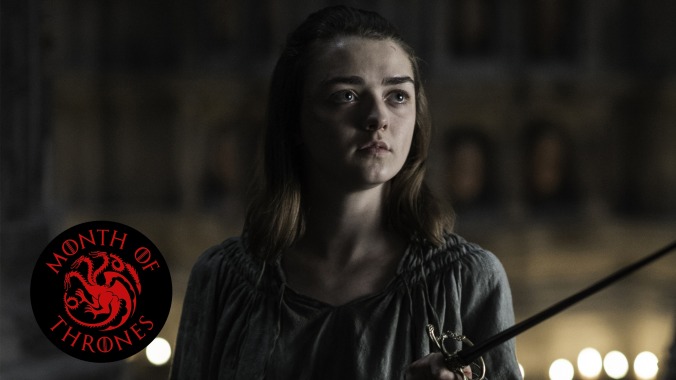“A girl is Arya Stark of Winterfell. And I’m going home.”
It would be understandable if you watched the end of “No One” with your hands raised in exasperation to the Many Faced God. After all that training, all the incremental kung-fu movie sequences and missions in the Braavosi streets, there’s Arya, refusing the mantle of Faceless Man. This, after two seasons and one incredible chase scene with the Waif that seems to owe equal debts to Battleship Potemkin and Terminator 2. At the end of it all, a girl is Arya Stark, and another child of the North concludes a storyline chockfull of blind alleys (if you’ll excuse the pun).
It’s understandable, but you’d be ignoring one of Game Of Thrones’ moments of traditional narrative satisfaction in a long, long while, set amid one of its most gratifyingly structurally rigorous episodes. “No One” puts in the work to hammer home themes and visual motifs, to pay off the consequences of decisions made long ago and in the course of the episode, and to prove that, in this world, a name means a great deal. This is an hour of Game Of Thrones where we see and hear how far the tales of the Starks, Lannisters, and Martells have traveled—and the twists they’ve taken along the way—an episode where director Mark Mylod makes great, tension-inducing use of indistinct figures stepping out of shallow focus to reveal their identities and their intent. (Sometimes, it’s for comedic effect, as with Sandor Clegane’s appearance; sometimes, it’s for dread, as with the Waif’s.) Before Arya declares her desire to return to her ancestral stronghold, her great uncle dies defending his. “Fuck your name,” Clegane tells a vengeful Brotherhood Without Banners—but when did Arya ever listen to him? The words “Arya Stark” still hold great meaning to her, and they give her meaningful things to strive for, and more meaningful entities to serve.
And so there you have Arya, reclaiming heritage and weapon, marking her triumph as the episode’s last bit of “She’s right behind me, isn’t she?” The Braavos arc can’t have been a waste of time, because it’s made her realize who she is, and taken both character and actor to new stages in their evolutions. (And she took care of Maryn Trant along the way, which has to count for something.) Opaque to the last, Jaqen H’ghar says nothing as his former pupil exits the House Of Black And White, his reaction as open to interpretation as anything the character has ever done. His smile could reflect pride in Arya. Maybe she’s surprised him. Maybe, just maybe, this was his plan all along—now that would be something worth getting mad about.
What we said then
The “newbies” recap considers what’s waiting around the corner for Arya:
“Frustrating as it is, I wonder how much more interesting the show would be if Arya had to worry that every new face she saw were a Faceless Man come to get her. Is Game Of Thrones getting soft in its old age? (Yes. The outsize sadism of season five paved the way for the equally exaggerated comforts of season six: resurrections, reunions, characters previously powerless gaining power.) But that resolution comes from Arya leveling up. She embraces who she is—a Stark—and she rejects who she’s not—“no one.” I’m not sure she could have killed Jaqen, but she at least symbolically spares him, even though he admits to taking a hit out on her. This is a far cry from the girl who brutally executed Meryn Trant. That’s why Arya defeats the Waif off-screen. It would have been impossible not to revel in that violence if we could watch it, and that would undermine the whole thing.”
Elsewhere in the episode
Varys ships out of Meereen just before the masters ship in—the latter an occasion for Daenerys’ dramatic return. Tommen, increasingly under the thrall of the High Sparrow, delivers bad news for his mother and Loras Tyrel when he outlaws trial by combat (TRIAL BY COMBAT!), but the truly bad news is what Qyburn whispers to Cersei after the declaration. Brienne attempts to negotiate the peaceful surrender of Riverrun to the Lannister forces, a segment that’s fraught with conflicted loyalties and complicated affections for sisters and enemies that also manages to work in Bronn making reference to Pod’s legendary sexual prowess. It’s a bigger laugh than any of the jokes Tyrion, Grey Worm, and Missandei tell while kicking back in the Great Pyramid of Meereen.


 Keep scrolling for more great stories from A.V. Club.
Keep scrolling for more great stories from A.V. Club.